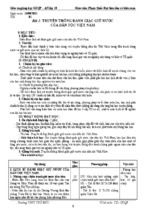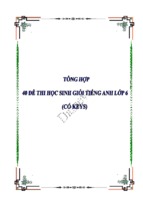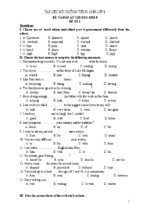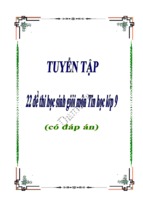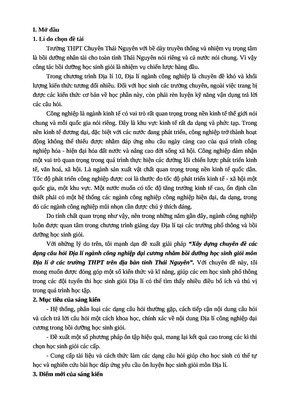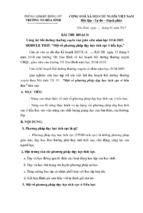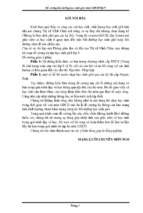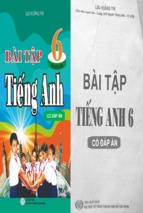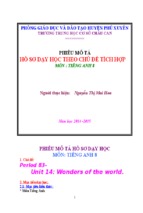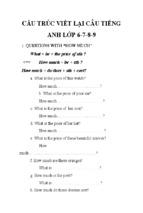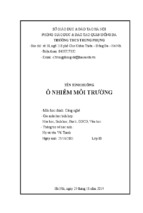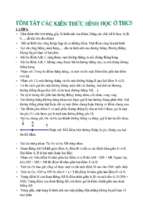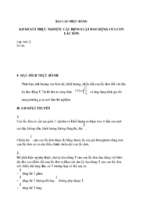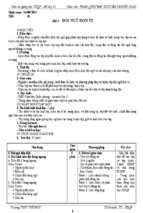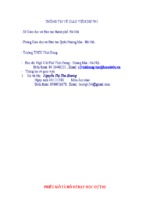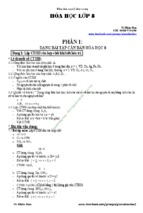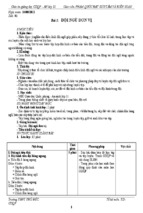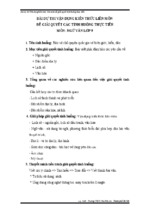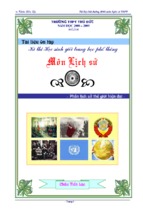Trường THCS Khai Quang
ĐỀ CƯƠNG ÔN TẬP VÀO LỚP 10 – TIẾẾNG ANH
TENSES
TENSES
SIMPLE PRESENT
(HIỆN TẠI ĐƠN)
+: S + V1 / V(s/es)
(Thì)
USE
- thói quen ở hiện tại
- sự thật, chân lí.
SIGNAL WORDS
- always, usually, often,
sometimes, seldom, rarely,
never, every, normally,
regularly, occasionally, as a
rule …
EXAMPLES
- She often goes to
school late.
- The sun rises in the
east.
- hành động đang diễn ra
vào lúc nói.
- dự định sẽ thực hiện
trong tương lai gần.
- hành động có tính chất
tạm thời.
- at the moment, now, right
now, at present
- Look!
- Listen!
- Be quiet!
- Keep silence!
Note: một số động từ
thường không dùng với thì
tiếp diễn: like, dislike, hate,
love, want, prefer, admire,
believe, understand,
remember, forget, know,
belong, have, taste, smell,
….
- lately, recently (gần đây)
- so far, up to now, up to
the present (cho tới bây
giờ)
- already, ever, never, just,
yet, for, since.
- how long …
- this is the first
time/second time…
- many times / several times
- yesterday, last week, last
month, …ago, in 1990, in
the past, …
- I can‟t answer the
phone. I’m having a
bath.
- She is going to the
cinema tonight.
- He often goes to work
by car, but today he is
taking a bus.
-: S + don’t/ doesn’t + V1
?: Do / Does + S + V1 …?
PRESENT PROGRESSIVE
(HIỆN TẠI TIẾP DIỄN)
+: S + am/is/are + V-ing
-: S + am/ is/ are + not + V-ing
?: Am / Is /Are + S + V-ing?
PRESENT PERFECT
(HIỆN TẠI HOÀN THÀNH)
+: S + has / have + P.P
-: S + has / have + not + P.P
- hành động bắt đầu trong
quá khứ, kéo dài đến hiện
tại và có thể tiếp tục trong
tương lai.
- hành động vừa mới xảy
ra.
?: Has / Have + S + P.P?
SIMPLE PAST
(QUÁ KHỨ ĐƠN)
+: S + V2 / V-ed
-: S + didn’t + V1
?: Did + S + V1 ….?
- hành động xảy ra và
chấm dứt ở một thời điểm
xác định trong quá khứ.
- một chuỗi hành động
xảy ra liên tục trong quá
khứ.
- một thói quen trong quá
khứ
- I have learnt English
for five years.
- She has just received
a letter from her father.
- She went to London
last year.
- The man came to the
door, unlocked it,
entered the room, went
to the bed and lay down
on it.
- When we were
students, we often went
on a picnic every
weekend.
Trường THCS Khai Quang
PAST PROGRESSIVE
(QUÁ KHỨ TIẾP DIỄN)
+: S + was / were + V-ing
-: S + was / were + not + V-ing
- hành động đang xảy ra
tại một thời điểm xác
định trong quá khứ
- hai hành động cùng xảy
ra đồng thời trong quá
khứ
- at that time, at (9 o‟clock)
last night, at this time (last
week),
- He was doing his
homework at 8 o‟clock
last night.
- The children were
playing football while
their mother was
cooking the meal.
- hành động xảy ra trước
hành động khác hoặc
trước một thời điểm trong
quá khứ
- already, ever, never,
before, by, by the time,
after, until, when, ….
- When I arrived at the
party, they had already
left.
- I had completed the
English course by
1998.
- hành động sẽ xảy ra
trong tương lai
- một quyết định được
đưa ra vào lúc nói
- tomorrow, next, in 2012,
….
- I think / guess
- I am sure / I am not sure
- He will come back
tomorrow.
- The phone is ringing.
I will answer it.
?: Was / Were + S + V-ing…?
PAST PERFECT
(QUÁ KHỨ HOÀN THÀNH
+: S + had + P.P
-: S + hadn’t + P.P
?: Had + S + P.P …?
SIMPLE FUTURE
(TƯƠNG LAI ĐƠN)
+: S + will / shall + V1
-: S + will / shall + not + V1
(won’t / shan’t + V1)
?: Will / Shall + S + V1 …?
Lưu ý cách dùng của Be going to + V1
- diễn tả một dự định đã được sắp đặt trước
- diễn tả một dự đoán có căn cứ
Ex: The sky is absolutely dark. It is going to rain.
Note:
- hai hành động xảy ra trong quá khứ:
. hành động ngắn dùng thì quá khứ đơn, hành động dài dùng thì quá khứ tiếp
diễn Ex: Yesterday morning, I met my friend while I was going to school.
. hành động xảy ra trước dùng thì quá khứ hoàn thành, hành động xảy ra sau dùng thì
quá khứ đơn Ex: She went out with her friends after she had finished her homework.
She had finished her homework before she went out with her friends.
Một số cách hòa hợp thì giữa mệnh đề chính và mệnh đề thời gian:
Main clause
(Mệnh đề chính)
Present tenses
Past tenses
Future tenses
1.TLĐ + until / when / as soon as + HTĐ
2. TLĐ + after + HTHT
Adverbial clause of time
(Mệnh đề trạng ngữ chỉ thời gian)
Present tenses
Past tenses
Present tenses
I will wait here until she comes back.
He will go home after he has finished his work.
Trường THCS Khai Quang
3. while / when / as + QKTD, QKĐ
While I was going to school, I met my friend.
4. QKĐ + while / when / as + QKTD
It (start) --------------- to rain while the boys (play)-------------- football.
5. QKTD + while + QKTD
Last night, I was doing my homework while my sister was playing games.
6. HTHT + since + QKĐ
I (work) -------------------here since I (graduate)--------------------.
7. After + QKHT, QKĐ
After I had finished my homework, I (go) --------------- to bed.
8.Before / By the time + QKĐ + QKHT
Before she (have) ---------------dinner, she (write)------------- letter.
PASSIVE VOICE
(Câu bị động)
I. CÁCH CHUYỂN ĐỔI TỪ CÂU CHỦ ĐỘNG SANG CÂU BỊ ĐỘNG
Active:
SUBJECT + VERB + OBJECT
Passive:
SUBJECT + BE + P.P + BY + OBJECT
II. CÁCH CHUYỂN ĐỔI HÌNH THỨC ĐỘNG TỪ CỦA MỘT SỐ THÌ
TENSES
Simple present
Present continuous
Present perfect
Simple past
Past continuous
Past perfect
Simple future
Future perfect
ACTIVE FORM
V1 / Vs(es)
Am / is / are + V-ing
Has / have + P.P
V2 / V-ed
Was / were + V-ing
Had + P.P
Will / shall + V1
Will/ shall + have + P.P
PASSIVE FORM
Am / is / are + P.P
Am / is / are + being + P.P
Has / have + been + P.P
Was / were + P.P
Was / were + being + P.P
Had + been + P.P
Will / shall + be + P.P
Will / shall + have + been + P.P
Note:
- Trạng từ chỉ nơi chốn đứng trước by + O; trạng từ chỉ thời gian đứng sau by + O
- Nếu chủ từ trong câu chủ động là từ phủ định thì đổi sang câu bị động phủ định.
- Các chủ từ someone, anyone, people, he, she, they … trong câu chủ động thì có thể bỏ “by + O” trong câu bị
động
WISH CLAUSES
Có 3 dạng câu mong ước:
- Mong ước không thật ở hiện tại:
KĐ: S + wish(es) + S + V2/-ed + O
PĐ: S + wish(es) + S + didn‟t + V1
Ex: Ben isn‟t here. I wish Ben were here.
I wish I could swim.
- Mong ước không thật ở quá khứ:
KĐ: S + wish(es) + S + had + V3/-ed
PĐ: S + wish(es) + S + hadn‟t + V3/-ed
-
Mong Ước không thật trong tương lai
(Mệnh đề mong ước)
(to be: were / weren‟t)
KĐ: S+ wish(es) + S + would + V1
PĐ: S + wish(es) + S + wouldn‟t + V1
Ex: I wish you would stop smoking.
Note: S + wish(es) có thể thay bằng If only
Ex: I wish I weren’t so fat. = If only I weren’t so fat.
GIỚI TỪ CHỈ THỜI GIAN
1. AT: vào lúc
- dùng chỉ thời gian trong
ngày At + giờ
At midnight
nừa đêm
At night
buổi tối
At lunchtime
vào giờ ăn trưa
At sunset
lúc mặt trời lặn
At sunrise
lúc mặt trời lặn
Dawn
lúc bình minh
At noon
giữa trưa (lúc 12 giờ trưa)
- dùng chỉ một dịp lễ hội, một thời khắc nào đó
At Easter
vào lễ phục sinh
At Christmas
vào lễ Giáng sinh
At New Year
At present, At the moment
At this / that time
At the same time
cùng thời gian
At the end / beginning of this month / next month
At the age of
ở lứa tuổi
2. ON: vào
- dùng chỉ thứ trong tuần, ngày trong tháng
dùng chỉ buổi trong ngày
3. IN: trong
- dùng chỉ buổi trong ngày nói chung, một kỳ nghỉ, một học kỳ
In the Easter holiday
In the summer term
trong học kỳ hè
In the summer holiday trong kỳ nghỉ hè
- dùng cho tháng, mùa, năm, thập kỷ, thế kỷ, thời đại và thiên niên kỷ
th
In August , In the summer / winter / spring / autumn, In 2010, In the 1990s, In the 19 century In
rd
the Middle Ages, In the 3 millennium
- dùng trong một số cụm từ để chỉ thời gian trong tương lai
In a moment / in a few minutes / in an hour / in a day / in a week / in six months
In the end
cuối cùng
* Note:
On time
đúng giờ (không trễ)
đúng lúc, kịp lúc In the end ≠ at first
In time
In the end
cuối cùng
Ex: He got more and more angry. In the end, he walked out of the room.
ADVERBS CLAUSES OF RESULT (Mệnh đề trạng ngữ chỉ kết quả)
Mệnh đề trạng ngữ chỉ kết quả bắt đầu bằng các từ so, therefore (vì vậy, vì thế)
Lưu ý dấu chấm câu. Của so và therefore
Ex: He is ill so he can‟t go to school. / He is ill, so he can‟t go to school.
He is ill. Therefore, he can‟t go to school. / He is ill; therefore, he can‟t go to
school. Một số liên từ khác cần lưu ý: and, but, however, because, since, as
CONDITIONAL SENTENCES (Câu điều kiện)
1.Type 1: điều kiện có thể xảy ra ở hiện tại hoặc tương lai
If clause
S + V1 / V s(es)
(don’t / doesn’t + V1)
Main clause
S + will / can/ may + V1
(won’t / can’t + V1)
2.Type 2: điều kiện không có thật ở hiện tại
If clause
Main clause
S + V-ed / V2
S + would / could / should + V1
(didn’t + V1)
(wouldn’t / couldn’t + V1)
To be: were / weren’t
3. Type 3: điều kiện không có thật trong quá khứ
If clause
S + had + P.P
(hadn’t + P.P)
Main clause
S + would / could / should + have + P.P
(wouldn’t / couldn’t + have + P.P)
4. Những cách khác để diễn đạt câu điều kiện:
a. Unless = If ….not
If you don’t work hard, you can‟t earn enough money for your living.
= Unless --------------------------------------------------------------------------------------------------------b. Without: không có = if … not
Without water, life wouldn‟t exist.
= If ---------------------------------------------------------------------------------------------------------------Note:
1. Có thể diễn tả câu điều kiện mà không cần dùng if hay unless bằng cách
đảo ngữ. Were I rich, I would help you.
= If I were rich, I would help you.
Had I known her, I would have made friend with her.
= If I had known her, I would have made friend with
her. If you should run into Peter, tell him to call me.
= Should you run into Peter, tell him to call me.
2. Có thể kết hợp điều kiện 2 và điều kiện 3 trong một câu.
If I hadn’t stayed up late last night, I wouldn’t be so tired now.
You wouldn’t be so hungry if you had had breakfast this morning.
3. Đôi khi thì hiện tại đơn được dùng cho cả hai mệnh đề của câu điều kiện để diễn tả một sự thật hiển nhiên;
nó được gọi là zero conditional.
If we don’t water these flowers, they die.
4. Mệnh đề chính trong câu điều kiện loại 1 có thể là một câu đề nghị hoặc lời mời.
If you see Peter at the meeting, please tell him to return my book.
If you are free now, have a cup of coffee with me.
5. Đổi từ if sang unless:
IF
UNLESS
Khẳng định
Khẳng định (động từ trong mệnh đề chính đổi sang phủ định)
Phủ định
Khẳng định (mệnh đề chính không thay đổi)
Ex: If we had more rain, our crops would grow faster.
Unless -----------------------------------------------------------------------------------
If she doesn‟t work harder, she will fail the exam.
Unless ------------------------------------------------------------------------------------
6. Dạng câu: Mệnh lệnh + or + Clause
- If you don’t + V1, Clause
- If you aren’t + …, Clause
Ex: Be carefull or you will cut yourself.
Go away or I will call the police.
If ------------------------------------------------------If -------------------------------------------------------
REPORTED SPEECH (Câu tường thuật)
Câu gián tiếp là câu dùng để thuật lại nội dung của lời nói trực tiếp.
a. Nếu động từ của mệnh đề tường thuật dùng ở thì hiện tại thì khi đổi sang câu gián tiếp ta chỉ đổi ngôi;
không đổi thì của động từ và trạng từ.
b. Nếu động từ của mệnh đề tường thuật dùng ở thì quá khứ thì khi chuyển sang câu gián tiếp ta đổi ngôi,
thì của động từ, trạng từ chỉ thời gian và nơi chốn.
I. Thay đổi ngôi (Đại từ nhân xưng, Đại từ sở hữu và Tính từ sở hữu)
1. Ngôi thứ nhất: dựa vào chủ từ của mệnh đề tường thuật; thường đổi sang ngôi thứ ba
I → He / She me → him / her my → his / her We → They us →
them our → their
2. Ngôi thứ hai: (You, your)
- Xét ý nghĩa của câu và đổi cho phù hợp, thường đổi dựa vào túc từ của mệnh đề tường thuật
3. Ngôi thứ ba (He / She / Him / Her / His / They / Them / Their): giữ nguyên, không đổi
II. Thay đổi vềề thì trong câu:
DIRECT
Simple present - V1 /Vs(es)
Present progressive – am / is / are + V-ing
Present perfect – have / has + P.P
Present perfect progressive – have / has been +V-ing
Simple past – V2 / -ed
Past progressive – was / were + V-ing
Simple future – will + V1
Future progressive will be + V-ing
III. Thay đổi các trạng từ chỉ thời gian và nơi chốn:
DIRECT
Now
Then
Here
There
This
That
INDIRECT
Simple past – V2 / V-ed
Past progressive – was / were + V-ing
Past perfect – had + P.P
Past perfect progressive - had been + V-ing
Past perfect – had + P.P
Past perfect progressive – had been +V-ing
Future in the past - would + V1
Future progressive in the past - would be + V-ing
INDIRECT
These
Today
Tonight
Yesterday
Last year
Tomorrow
Next month
Ago
Those
That day
That night
The day before / the previous day
The year before / the previous year
The following day / the next day / the day after
The following month / the next month / the month after
Before
Subject
I
You
He
She
It
We
They
BẢNG ĐẠI TỪ
Object
Adjective possessive
me
My
you
your
him
his
her
her
it
its
us
our
them
their
CÁC THAY ĐỔI CỤ THỂ CHO TỪNG LOẠI CÂU TRONG LỜI NÓI GIÁN TIẾP
1. Câu mệnh lệnh, câu đề nghị
- Mệnh lệnh khẳng định:
Direct:
S + V + O: “V1 + O …”
Indirect:
S + asked / told + O + to + V1 + ….
Ex: He said to her: “Keep silent, please.” → He told
- Mệnh lệnh phủ định:
Direct:
S + V + O: “Don’t + V1 + …”
Indirect:
S + asked / told + O + not + to+ V1 ….
------------------------------------h er
→ The teacher ------------------------------------------------------------------2. Câu trần thuật
Direct:
S + V + (O) : “clause”
Indirect:
S + told / said + (O) + (that) + clause
Note: said to → told
Ex: Tom said, “I want to visit my friend this weekend.”
→ Tom said (that) -----------------------------------------------------------------------She said to me, “I am going to Dalat next summer.”
→ She told me (that) ------------------------------------------------------------------3. Câu hỏi
a. Yes – No question
Direct:
S + V + (O) : “Aux. V + S + V1 + O….?”
Indirect:
S + asked + O + if / whether + S + V + O ….
Ex: He asked: “Have you ever been to Japan, Mary?” → He asked Mary -------------------------------“Did you go out last night, Tan?” I asked → I asked Tan ------------------------------------------------b. Wh – question
Direct:
S + V + (O): “Wh- + Aux. V + S + V1 + O ?”
Indirect:
S + asked + O + Wh- + S + V + O.
Ex: “How long are you waiting for the bus?” he asked me.
→ He asked me -----------------------------------------------------------------------------------------
TAG QUESTIONS (Câu hỏi đuôi)
1. Quy tắc chung:
- Câu nói và phần đuôi luôn ở dạng đối nhau
câu nói khẳng định, đuôi phủ
định? câu nói phủ định, đuôi
khẳng định?
Ex: The children are playing in the yard, aren’t they?
They can‟t swim, can they?
- Chủ từ của câu nói là đại từ, ta lặp lại đại từ
này Ex: She is a doctor, isn’t she?
- Chủ từ là danh từ, ta dùng đại từ tương ứng thay thế
Ex: People speak English all over the world, don’t they?
- Đại từ bất định nothing, everything: được thay bằng
“it” Ex: Everything is ready, isn’t it?
- Các đại từ no one, nobody, someone, somebody, everyone, everybody, anyone, anybody: được thay bằng
“they” Ex: Someone called me last night, didn’t they?
- Đại từ this / that được thay bằng “it”; these / those được thay bằng “they”
- “There” trong cấu trúc “there + be” được dùng lại ở phần
đuôi Ex: There aren‟t any students in the classroom, are
there?
- Câu nói có trợ động từ (will / can / shall / should / is / are …): trợ động từ được lặp lại ở phần
đuôi Ex: You will come early, won’t you?
- Câu nói không có trợ động từ: trợ động từ do / does / did được dùng ở phần đuôi
- Câu nói có chứa các từ phủ định thì phần đuôi khẳng đ5nh
Ex: He never comes late, does he?
Note: Động từ trong phần đuôi ở phủ định thì luôn được viết ở dạng rút gọn.
2. Một số trường hợp đặc biệt:
- Phần đuôi của I AM là AREN’T I
Ex: I am writing a letter, aren’t I?
- Phần đuôi của Let’s là SHALL WE
Ex: Let‟s go out tonight, shall we?
- Câu mệnh lệnh khẳng định:
+ dùng phần đuôi WON’T YOU để diễn tả lời mời
+ dùng phần đuôi WILL / WOULD / CAN / CAN’T YOU để diễn tả lời yêu cầu lịch sự
Ex: Have a piece of cake, won‟t
you? Close the door, will you?
- Câu mệnh lệnh phủ định: dùng phần đuôi WILL YOU để diễn tả lời yêu cầu lịch sự
- Phần đuôi của ought to là SHOULDN’T
Ex: She ought to do exercise every morning, shouldn’t she?
INFINITIVES AND GERUNDS
(To-inf và V-ing)
1. To-infinitive
- Sau các động từ: Agre , appear, afford, ask, demand, expect, hesitate, intend, invite, want, wish, hope,
promise, decide, tell, refuse, learn, fail (thất bại), plan, manage, pretend (giả vờ), remind, persuade, encourage,
force, order, urge (thúc giục), seem, tend, threaten,…
- Trong các cấu trúc:
+ It takes / took + O + thời gian + to-inf
+ chỉ mục đích (để)
+ sau các từ hỏi: what, where, when, how, …
+ It + be + adj + to-inf: thật … để ..
+ S + be + adj + to-inf
+ S + V + too + adj / adv + to-inf
+ S + V + adj / adv + enough + to-inf
+ S + find / think / believe + it + adj + to-inf
Ex: I find it difficult to learn English vocabulary.
- Sau các từ nghi vấn: what, who, which, when, where, how ,… (nhưng thường không dùng sau
why) Ex: I don‟t know what to say.
* Note:
- allow / permit/ advise / recommend + O + to-inf
- allow / permit / advise / recommend + Ving She allowed me to use her pen.
She didn‟t allow smoking in her room.
2. Bare infinitive (V1)
Động từ nguyên mẫu không to được dùng:
- Sau động từ khiếm khuyết: can, will, shall, could, would,…
- Sau các động từ: let, make, would rather, had
better Ex: They made him repeat the whole story.
- Help + to-inf / V1 / with Noun
Ex: He usually helps his sister to do her homework.
He usually helps his sister do her homework.
He usually helps his sister with her homework.
II. GERUND (V-ing)
- Sau các động từ: enjoy, avoid, admit, appreciate (đánh giá cao), mind (quan tâm, ngại), finish, practice,
suggest, postpone (hoãn lại), consider (xem xét), hate, admit (thừa nhận), like, love, deny (phủ nhận), detest
(ghét), keep (tiếp tục), miss (bỏ lỡ), imagine (tưởng tượng), mention, risk, delay (trì hoãn), ….
- Sau các cụm động từ: cant‟ help (không thể không), can’t bear / can’t stand (không thể chịu được), be used
to, get used to, look forward to, it’s no use / it’s no good (không có ích lợi gì), be busy, be worth (đáng giá)
- Sau giới từ: in, on, at, from, to, about …
- Sau các liên từ: after, before, when, while, since,…
Ex: You should lock the door when leaving your room.
- S + spend / waste + time / money + V-ing
Ex: I spent thirty minutes doing this exercise.
III. INFINITIVE OR GERUND
1. Không thay đổi nghĩa:
- begin / start / continue/ like / love + To-inf / Ving Ex: It started to rain / raining.
2. Thay đổi nghĩa:
+ remember / forget / regret + V-ing: nhớ / quên/ nuối tiếc việc đã xảy ra rồi (trong quá khứ)
+ remember / forget / regret + to-inf: nhớ / quên/ nuối tiếc việc chưa, sắp xảy ra (trong tương lai)
Ex: Don‟t forget to turn off the light when you go to bed.
I remember meeting you some where but I can‟t know your name.
Remember to send her some flowers because today is her birthday.
+ stop + V-ing: dừng hẳn việc gì
+ stop + to-inf: dừng ….. để …
+ try + V-ing: thử
+ try + to-inf: cố gắng
+ need + V-ing = need + to be + V3: cần được (bị động)
+ need + to-inf: cần (chủ động)
Ex: I need to wash my car.
My car is very dirty. It needs washing / to be washed.
+ Cấu trúc nhờ vả:
S + have + O người + V1 + O vật ...
S + have + O vật + V3 + (by + O người) ...
S + get + O người + to-inf + O vật
S + get + O vật + V3 + (by + O người)
ADJECTIVES AND ADVERBS (Tính từ và trạng từ)
1. Tính từ:
- Đứng trước danh từ: adj + N
- Sau động từ to be
- Sau các động từ liên kết như: become, get, feel, look, seem, taste, smell, sound,…
- Sau các đại từ bất định: something, anything, everything, nothing, somebody, someone, anybody, anything,…
- Trước enough
- Trong cấu trúc so + adj + that
2. Trạng từ:
- Đứng sau động từ thường
- be + adv + V3/-ed
- Một số từ vừa là tính từ, vừa là trạng từ: fast (nhanh), hard, early, late (trễ)
3. Tính từ + Mệnh đề
Một số tính từ chỉ cảm giác như: glad, happy, pleased, delighted, excited, sorry, disappointed, amazed, có
thể có một mệnh đề theo sau
Ex: We are happy that you won the
scholarship. Adj
ADVERB CLAUSES OF REASON (Mệnh đề chỉ lý do)
1. Mệnh đề chỉ lý do:
Because / As / Since + S +
V 2. Cụm từ chỉ lý do
Because of / Due to + V-ing / Noun
3. Cách rút gọn mệnh đề lý do sang cụm từ chỉ lý
do a. …. because + đại từ + be + adj .
→ because of + tính từ sở hữu +
N b. …because + N + be + adj
→ because of + the + adj + N
c. . …because + S + V + O
→ because of + V-ing + O (2chủ từ phải giống nhau)
CONNECTIVES (Từ nối)
1. and (và): dùng để thêm thông tin bổ sung
2. or (hoặc): diễn tả sự lựa chọn
3. but (nhưng): nối hai ý tương phản nhau
4. so (vì thế, do đó): diễn tả hậu quả
5. therefore (vì thế, do đó): đồng nghĩa với so, chỉ hậu quả
6. however (tuy nhiên): diễn tả sự tương phản, đồng nghĩa với but
PHRASAL VERBS (Động từ kép)
- Động từ kép là động từ được cấu tạo bởi một động từ với một tiểu từ hay một giới từ hay cả tiểu từ và giới từ.
1. Một sốố động từ kép thường gặp:
- turn on:
bật, mở
- turn off:
tắt
- turn down:
vặn nhỏ
- turn up
vặn lớn
- look for
tìm kiếm
- look after
chăm sóc = take care of
- go on
tiếp tục = continue
- give up
từ bỏ = stop
- try on
mặc thử
- put on
mặc vào
- wait for
chờ, đợi
- depend on
dựa vào
- escape from
thoát khỏi
- go away
đi xa
- come back
quay về
- take off
cất cánh, tháo ra
- run out (of)
cạn kiệt
2. Một số tính từ có giới từ đi kèm:
- interested in
thích, quan tâm
- fond of
thích thú
- full of
đầy ấp, nhiều
- next to
kế bên
- famous for
nổi tiếng về
- late for
trễ
- surprised at
ngạc nhiên về
- busy with
bận rộn
- succeed in
thành công
- belong to
thuộc về
- It‟s very kind of you to-inf bạn thật tốt bụng khi ….
- go out
- lie down
- throw away
- break down
đi chơi
nằm xuống
quăng, ném
hư hỏng
- bored with
- afraid of
- capable of
- accustomed to
- sorry for
- good at
- popular with
- worry about
- different from
- borrow from
- good for / bad for
chán
sợ
có khả năng
quen với
lấy làm tiếc
giỏi về
phổ biến với
lo lắng về
khác với
mượn từ
tốt / xấu cho
MAKING SUGGESTIONS (Đưa ra lời đề nghị)
* Các mẫu câu đề nghị:
- Let‟s + V1:
- Shall we + V1…?
- How about / What about + V-ing….?
- Why don‟t we + V1 ….?
Để trả lời cho câu đề nghị ta dùng:
- Đồng ý: + Yes, let‟s.
+ OK. Good idea.
+ Great. Go ahead.
+ Sounds interesting.
+ That‟s a good idea.
+ All right.
- Từ chối / Không đồng ý: + No, let‟s not.
+ I don‟t think it‟s a good idea.
+ No. Why don‟t we + V1 ….?
+ No. I don‟t want to.
+ I prefer to …….
* Câu đề nghị với động từ suggest:
S + suggest + V-ing ……….
S + suggest + that + S + should + V1 ……….. (từ that không được bỏ)
RELATIVE CLAUSES
* Đại từ quan hệ:
1. WHO: chủ từ, chỉ người
N (người) + WHO + V + O ….
2. WHOM:
- làm túc từ, chỉ người
…..N (người) + WHOM + S + V
3. WHICH:
- làm chủ từ hoặc túc từ, chỉ vật
(Mệnh đề quan hệ)
….N (thing) + WHICH + V + O
….N (thing) + WHICH + S + V
4. THAT:
- có thể thay thế cho vị trí của who, whom, which trong mệnh đề quan hệ quan hệ xác định
* Các trường hợp thường dùng “that”:
- khi đi sau các hình thức so sánh nhất
- khi đi sau các từ: only, the first, the last
- khi đi sau các đại từ bất định, đại từ phủ định, đại từ chỉ số lượng: no one, nobody, nothing,
anyone, anything, anybody, someone, something, somebody, all, some, any, little, none.
- khi danh từ đi trước bao gồm cả người và vật
* Các trường hợp không dùng that:
- trong mệnh đề quan hệ không xác định
- sau giới từ
5. WHOSE: dùng để chỉ sở hữu cho danh từ chỉ người hoặc vật, thường thay cho các từ: her, his, their, hoặc
hình thức ‘s
…..N (person, thing) + WHOSE + N + V ….
6. WHY: mở đầu cho mệnh đề quan hệ chỉ lý do, thường thay cho cụm for the reason, for that reason.
…..N (reason) + WHY + S + V …
7. WHERE: thay thế từ chỉ nơi chốn, thường thay cho there
….N (place) + WHERE + S + V ….
(WHERE = ON / IN / AT + WHICH)
8. WHEN: thay thế từ chỉ thời gian, thường thay cho từ then
….N (time) + WHEN + S + V …
(WHEN = ON / IN / AT + WHICH)
* Mệnh đề quan hệ
1. Mệnh đề quan hệ xác định: dùng khi danh từ không xác định, không có dấu phẩy ngăn cách với mệnh đề
chính.
2. Mệnh đề quan hệ không xác định: dùng khi danh từ xác định, có dấu phẩy ngăn cách với mệnh đề chính.
ADVERBIAL CLAUSES OF CONCESSION (Mệnh đề trạng từ chỉ sự nhượng bộ)
1. Mệnh đề chỉ sự nhượng bộ:
Although / Even though / Though + S + V, S + V + O: mặc dù
2. Cụm từ chỉ sự nhượng bộ:
Despite / in spite of + V-ing / Noun phrase: mặc dù
3. Rút gọn mệnh đề chỉ sự nhượng bộ thành cụm từ chỉ sự nhượng bộ:
a.
Though / although + đại từ + be + adj.
→ Despite / In spite of + tính từ sở hữu + N
b. Though / although + N + be + adj.
Despite / in spite of + the + adj. + N
c. Though / although + S + V + O
Despite / in spite of + V-ing + O (2 chủ từ phải giống nhau)
MODALS (Động từ khiếm khuyết)
1. May / might
KĐ: May / Might + V1:
PĐ : May / Might not + V1: diễn tả
- sự suy đoán (không chắc chắn)
- sự xin phép, cho phép
2. Must / mustn’t
3. have to + V1: phải, (có tính khách quan)
Note: Quá khứ của have to là had to + V1
Phủ định của have to là don’t / doesn’t / didn’t have to + V1
4. should + V1 = ought to + V1: nên
CLAUSES AND PHRASES OF RESULT (Mệnh đề và cụm từ chỉ kết quả)
1. Mệnh đề chỉ kết quả:
a. so ….that (quá … đến nỗi)
S+ be + so + adj. + that + S + V ……
S+ V thường + so + adv. + that + S + V
…… a. such …. that (quá … đến nỗi)
S+ V + such (a/an) + N + that + S + V ……
2. Cụm từ chỉ kết quả:
a. enough ….to (đủ …..để có thể)
S + be + adj. + enough (for O) + to-inf. (dùng for+ O khi 2 chủ từ khác nhau)
S + V thường + adv. + enough (for O) + to-inf.
S + V + enough + N + to-inf.
b. too ….to (quá ….không thể)
S + be (look / seem / become / get) + too + adj. (for O) + to-inf.
S + V thường + too + adv. (for O) + to-inf.
COMPARISONS (So sánh)
1. So sánh bằng:
S + be + as + adj. + as + ….
S + V thường + as + adv. + as+ ….
2. So sánh hơn:
a. Tính từ / Trạng từ ngắn:
S + V + adj. / adv. + ER + THAN + …..
b. Tính từ / Trạng từ dài:
S + V + MORE + adj. / adv. + THAN + …..
3. So sánh nhất:
a. Tính từ / Trạng từ ngắn:
S + V + THE + adj. / adv. + EST + …..
b. Tính từ / Trạng từ dài:
S + V + THE MOST + adj. / adv. + ….. 4.
Một số tính từ, trạng từ bất qui tắc
Good / well
Bad / badly
Far
better
worse
further
farther
Much / many
Little
Happy
Lazy
Clever
Narrow
more
less
happier
lazier
the best
the worst
the furthest
the farthest
the most
the least
the happiest
laziest
cleverer
the cleverest
narrower
the narrowest
TỪ CHỈ SỐ LƯỢNG
- many + N đếm được số nhiều: nhiều
- much + N không đếm được: nhiều
- few + N đếm được số nhiều: ít (không đủ để dùng)
- a few + N đếm được số nhiều: ít (đủ để dùng)
- some + N đếm được, không đếm được: một vài, một ít
- a lot of + N đếm được, không đếm được: nhiều
- little + N không đếm được: ít (không đủ để dùng)
- a little + N không đếm được: ít (đủ để dùng)
HIỆN TẠI PHÂN TỪ VÀ QUÁ KHỨ PHÂN TỪ (-ing and –ed participles)
- Hiện tại phân từ: thường dùng miêu tả vật, mang ý chủ động
- Quá khứ phân từ thường dùng miêu tả người, mang ý bị động
* Một sốố hiện tại phân từ và quá khứ phân từ thường gặp
Ex: suprise
surprising
surprised
1. bore
boring
bored
2. excite
exciting
excited
3. interest
interesting
interested
4. amuse
amusing
amused
5. disappoint
disappointing
disappointed
6. tire
tiring
tired
MỘT SỐ CẤU TRÚC KHÁC
1. Lối nói phụ họa:
a. Đồng ý theo một câu khẳng định, dùng:
- S + V trợ + too.
- So + V trợ + S.
b. Đồng ý theo câu phủ định, dùng:
- S + V trợ (phủ định) + either.
- Neither + V trợ (khẳng định) + S.
2. Would you mind / Do you mind + V-ing ….?
Do you mind if I + V (Hiện tại đơn)….? Would
you mind if I + V (Quá khứ đơn) ….?
3. Đổi thì quá khứ đơn sang hiện tại hoàn thành
- S + V hiện tại hoàn thành (phủ định) + for + thời gian
- It’s + thời gian + since + S + last + V quá khứ đơn.
- The last time + S + V quá khứ đơn + was + thời gian + ago.
Ex: I last went to Dalat nine years ago.
- I ---------------------------------------------------------------------------------- It -------------------------------------------------------------------------------- The -----------------------------------------------------------------------------
ngạc nhiên
chán, dở
hào hứng, phấn khởi
thú vị, hứng thú
buồn cười, vui nhộn
thất vọng
mệt mỏi
This is the first time + S + HTHT khẳng định
- S + HTHT never + before Ex:
This is the first time I have visited Hanoi.
- I ------------------------------------------------------------------------------4. used to
KĐ: S + used to + V1
(đã từng)
PĐ: S + didn’t use to + V1
(không từng)
NV: Did + S + use to + V1 ..?
(có từng ….không)
5. be used to / get used to + V-ing: quen với
6. It takes / took + O + time + to-inf….
7. S người + spend + time + V-ing…
8. It is + adj. + to-inf ..
→ V-ing + be + adj. : thật ….. để ….
9.Cụm từ chỉ mục đích:
S + V + to / in order to / so as to + V1: để
S + V + in order not to / so as not to + V1: để không
PRONUNCIATION
I. CÁCH PHÁT ÂM -S/-ES
- Có 3 cách phát âm –s hoặc –es tận cùng.
* đọc thành âm /iz/ với những từ có âm cuối là / s, z, ∫, t∫, d /
* đọc thành âm /s/ với những từ có âm cuối là / p, t, k, f, θ /
* đọc thành âm /z/ với những trường hợp còn lại
II. CÁCH PHÁT ÂM –ED
- Có 3 cách phát âm –ed tận cùng.
* đọc thành âm /id/ với những từ có âm cuối là / t, d /
* đọc thành âm /t/ với những từ có âm cuối là /p, f, k, s, ∫, t∫, θ /
* đọc thành âm /d/ với những trường hợp còn lại
III. TRỌNG ÂM
- Danh từ tận cùng –OO hay –OON: trọng âm đặt trên vần này
- Những từ có hậu tố là: -ade, -ee, -ese, -ette, -ique, -eer, -ain thì trọng âm chính rơi vào ngay âm tiết đó
Ex: lemo‟nade, ciga‟rette, Vietna‟mese, …
- Âm tiết liền trước các hậu tố -tion, -ical, -ual, -ian, -ical, -ity, -graphy, -ics, -logy thường nhận trọng âm
Ex:, trans‟lation, eco‟nomic, uni‟versity, poli‟tician, soci ‟ology, mathe ‟matics
- Đặt ở âm thứ 2 trước các hậu tố -ize, -ary
Ex: „modernize, „dictionary, i‟maginary
THÀNH LẬP TỪ, TỪ LOẠI
1. Cách nhận biết từ loại:
a. Cánh nhận biết danh từ: danh từ thường có các hậu tố sau:
- tion / ation
invention, information
-ment
development, instrument
- ence / ance
difference, importance
- ness
happiness, business
- er (chỉ người)
teacher, worker, writer, singer
- or (chỉ người)
inventor, actor
- ist (chỉ người)
physicist, biologist
- age
teenage, marriage
- ship
friendship, championship
b. Cánh nhận biết tính từ: tính từ thường có các hậu tố sau:
- ful
useful, helpful, beautiful
- less (nghĩa phủ định)
homeless, careless
(noun) - al (thuộc về)
natural, agricultural
- ous
dangerous, famous
- ive
expensive, active
- ic
electric, economic
- able
fashionable, comfortable
c . Cánh nhận biết trạng từ: trạng từ thường có hậu tố -LY. Ex: beautifully, carefully, suddenly,
carelessly, recently ...
- good (a)
well (adv): giỏi, tốt
- late (a)
late / lately (adv): trễ, chậm
- ill (a)
ill (adv): xấu, tồi, kém
- fast (a)
fast (adv): nhanh
- hard (a)
hard (adv): tích cực, vất vả, chăm chỉ
2. Chức năng của một số từ loại:
a. Danh từ (Noun)
Sau tính từ
(adj + N)
They are interesting books.
Sau
- mạo từ: a /an / the
- từ chỉ định: this, that, these, those, every, each, …
- từ chỉ số lượng: many, some, few, little, several ...
- tính từ sở hữu: my, his, her, your, our, their, its…
Sau ngoại động từ (V cần O)
Sau giới từ
(prep. + N)
Trước V chia thì (N làm chủ từ)
Sau enough
(enough + N)
b. Tính từ (Adj)
Trước N
Sau TO BE
(Adj + N)
She buys books.
She meets a lot of people.
He talked about the story yesterday.
He is interested in music.
The main has just arrived.
I don‟t have enough money to buy that house.
It becomes hot.
She feels sad.
It is extremely cold.
I‟m terribly sorry.
She is very beautiful.
That house is too small.
The house isn‟t large enough.
She was so angry that she can‟t speak.
(adv + adj)
Sau too
( be + too + adj)
Trước enough
(be + adj + enough)
Trong cấu trúc:
be + so + adj + that
A, an, the, this, that, his, her, their, my, … +
He is a student.
These flowers are beautiful.
She needs some water.
This is an interesting books.
I am tired.
Sau: become, get, look, feel, taste, smell, seem …
Sau trạng từ
hardly (adv): hầu như không
(Adj) +
My new car is blue.
Noun
c. Trạng từ (Adv)
Sau V thường
Trước Adj
Giữa cụm V
Đầu câu hoặc trước dấu phẩy
Sau too
V + too + adv
Trong cấu trúc
V + so + adv + that
Trước enough
V + adv + enough
He drove carefully.
I meet an extremely handsome man.
She has already finished the job.
Unfortunately, I couldn‟t come the party.
They walked too slowly to catch the bus.
Jack drove so fast that he caused an accident.
You should write clearly enough for every body to read.
III. BÀI TẬP: EXERCISES
TENSES
1. He was writing to his friend when he __________a noise.
A. was hearing
B. heard
C. had heard
D. hears
2. I __________many people since I came here in June.
D. have met
A. met
B. has met
C. was meeting
3. We __________ maths at this time last week.
D. learnt
A. were learning
B. are learning
C. was learning
4. She was playing games while he __________a football match.
D. watching
A. watched
B. watches
C. was watching
5. She __________to Ho Chi Minh city last year.
A. goes
B. has gone
C. go
D. went
6. Since we came here, we ______ a lot of acquaintances.
A. have had
B. had
C. have
D. are having
7. __________he playing football now?
A. Will
B. Does
C. Was
D. Is
8. Every morning, I often sit in my garden and____ to my nightingale sing.
A. listening
B. listen
C. listened
D. listens
9. She __________school when she was six.
A. start
B. started
C. has started
D. are starting
10. I. __________TV when the telephone rang.
A. watched
B. was watching
C. are watching
D. have watched
11. I will contact you as soon as I ___________the information.
A. will get
B. get
C. got
D. had got
12. If he's late again, I_____ very angry.
A. am going to be
B. will be
C. would be
D. am
13. A: “The phone is ringing” B. “ I ______it”.
A. answer
B. will answer
C. have answered
D. will be answering
14. Yesterday, I _______ for work late because I _______ to set my alarm.
A. had left / forgot
B. was leaving / was forgetting
C. left / had forgot
D. had been leaving / would forget
15. By the time we ____ to the train station, Susan _____ for us for more than two hours.
A. will get / has been waiting
B. got / was waiting
C. got / had been waiting
D. get / will wait
16. While her brother was in the army, Sarah ___________ to him twice a week.
A. was writing
B. wrote
C. has written
D. had written
17. The Titanic _______ the Atlantic when it _______ an iceberg.
A. was crossing / struck
B. had crossed / was striking
C. crossed / had struck
D. is crossing / strikes
18. In the 19th century, it _______ two or three months to cross North America by covered wag on.
A. took
B. had taken
C. had taken
D. was taking
19. Last night at this time, they _______ the same thing. She ______ and he _________ the Newspaper.
A. are not doing / is cooking / is reading
B. were not doing / was cooking / was reading
C. was not doing / has cooked / is reading
D. had not done / was cooking /read
20. After he ____________ his English course, he went to England to continue his study.
A. finish
B. finishes
C. finished
D. had finished
31. When I walk past the park, I saw some children play football.
A
B
C
D
32. After John eaten dinner, he wrote several letters and went to bed.
A
B
C
D
33. What did you do at 9 o'clock last night? I phoned you but nobody answered.
A
B
C
D
34. When I arrived at the station, the train has already left.
A
B
C
D
35. Ann and Susan have known each other during they were at school.
A
B
C
D
36. She has disappeared three days ago, and they are still looking for her now.
A
B
C
D
37. After Mrs. Wang had returned to her house from work, she was cooking dinner
38.
It‟s the first time I saw this film
39. After he graduates from university, he joined the army.
40. Up to now, there had been no woman being chosen the US president.
41. It‟s a long time since we last went to the cinema.
A. We have been to the cinema for a long time.
B. We haven‟t been to the cinema for a long time.
C. We don‟t go to the cinema as we used to.
D. We wish we went to the cinema now.
42. The last time I saw Rose was three years ago.
A. I didn‟t see Rose for three years.
B. I haven‟t seen Rose three years ago.
C. I haven‟t seen Rose since three years.
D. I haven‟t seen Rose for three years.
43. I haven't visited the museum for three months.
A. It is three months since I have visited the museum.
B. I didn't visit the museum three months ago.
C. The last time I had visited the museum was three months ago.
D. It is three months since I visited the museum.
44. "John began playing the piano 10 years ago"
A.John played the piano 10 years ago.
B.John used to play the piano 10 years ago.
45. The last time I saw her was a week ago.
A.I haven't seen her for a week.
B.I have seen her for a week.
1.
2.
3.
4.
5.
6.
7.
8.
9.
10.
11.
12.
13.
14.
15.
16.
17.
18.
19.
20.
C. John has played the piano for 10 years.
D. John doesn't play the piano anymore
.
C. I haven't seen her since a week.
D. I have seen her since a week.
Last night we (watch) __________TV when the power (fail) __________.
London (change) ___________ a lot since we first (come) __________ to live here.
I (spend) __________ a lot of time travelling since I (get) __________this new job.
She (have) __________a hard life, but she‟s always smiling.
He sometimes (come) __________ to see his parents.
Last month I (be) _____________ in the hospital for ten days.
What you (do) ____________________ when I (ring) ________________ you last night?
I (not see) __________________ him since last Sunday.
My mother (come) __________________ to stay with us next week.
When he lived in Manchester, he (work) _________________ in a bank.
Columbus (discover) ___________________ America more than 400 years ago.
Listen! The birds (sing) ________________.
You (receive) _______________ any letter from your parents yet?
How long Bob and Mary (be) ___________________ married?
She (ask) _________________ me to tellabout him several times.
John (watch) __________________ TV at 8:00 last evening.
He (do) ________________ his homework before he (go) _____________ to the cinema.
Hurry up! The train (come) ____________________.
We (not talk) _______________ to each other for a long time.
He (feel) _________________ asleep while he (do) __________________ his homework.
PASSIVE VOICE
Change into passive voice.
1. The teacher corrects our exercises at home.
3. Alice gave me a wonderful present.
4. They are building several new schools in our town.
5. We have made great progress in industry, science and medicine.
6. Sam killed a lion last week.
7. You must hand in your report before the end of this month.
8. I had just finished the job when the factory closed.
9. No one has opened that box for the past hundred years.
10. Are you going to mail these letters soon?
11. He should have finished the report yesterday.
12. Scientists began to carry out researches on SIDA two years ago.
13. They say that he is the richest man in our town.
14. I can assure you I will arrange everything in time.
15. We are to pity rather than despise these homeless boys.
16. We haven‟t moved anything since they sent you away to cure you.
___________________________________________________________
16. Many U.S automobiles ..................
in Detroit, Michigan.
A. manufacture
B. have manufactured C. are manufactured
D. are manufacturing
17. When I came, an experiment .................. in the lab.
A. was being holding
B. has been held
C. was being held
D. has held
18. Last night a tornado swept through Rockvill. It ............. everything in its path.
A. destroyed
B. was destroyed
C. was being destroyed D. had been destroyed
19. This exercise may ..................
with a pencil.
A. be written B. be to write C. be writing D. write
20. This picture .................... by Johnny when I came.
A. painted
B. was painted
C. was being painted D. had been painted
21. They speak much about this book.
A. This book is much spoken about.
B. This book is much spoken.
C. This book is much about spoken.
D. This book are much spoken about.
22. My shirt ..................
by my sister on my last birthday.
A. gave
B. was given
C. had been given
D. was being given
23. Hamlet was wrote by William Shakespeare.
24. Daisy's ring is make of gold.
AB CD
25. This exercise may.....................with a pencil.
A. be written
B. be to write
C. be writing
26. The university.......................by private funds as well as by tuition income.
A. is supported
B. supports
C. is supporting
27. He broke my watch.
A. My watch were broken.
B. My watch be broken.
C. My watch is broken.
D. My watch was broken.
28. You have to do your homework every day.
D. write
D. has supported
A. Your homework has been done every day.
B Your homework has to do by you every day.
C Your homework has to be done every day.
D Your homework have to be done every day.
29. Lots of houses_____________ by the earthquake.
A. are destroying
B. destroyed
C. were destroying
D. were destroyed
30. The telephone ______________ by Alexander Graham Bell.
A. invented
B. is inventing
C. be invented
D. was invented
WISH CLAUSES
1. I wish I (see) ____________ her off at the airport yesterday.
2. Tom wishes he (have) _________ enough money to buy a new car now.
3. Mary wishes she (become) _________ an astronaut someday.
4. He wishes he (not/buy) ______________ that old car.
5. I‟m really sorry I didn‟t invite her to the party.
I really wish …………………………………………………..
6. I‟m sorry I can‟t help you do your homework.
I wish …………………………………………………..
7. She doesn‟t like to work with him.
She wishes …………………………………………….
1. I don't understand this point of grammar. I wish I ______ it beter.
A. understood
B. would understand
C. had understood
D. understands
2. It never stops raining here. I wish it ______ raining.
A. stopped
B. would stop
C. had stopped
D. will stop
3. I miss my friends. I wish my friends ______ here right now.
A. were
B. would be
C. had been
D. was
4. I should never have said that. I wish I ______ that.
A. didn't say
B. wouldn't say
C. hadn't said
D. says
5. I speak terrible English. I wish I ______ English well.
A. spoke
B. would speak
C. had spoken
D. speaks
6. I cannot sleep. The dog next door is making too much noise. I wish it ______ quiet.
A kept
B. would keep
C. had kept
D. will keep
7. This train is very slow. The earlier train was much faster. I wish I ____ the earlier train.
A. caught
B. would catch
C. had caught
D. catches
8. I didn't see the TV programme but everybody said it was excellent. I wish I ___ it.
A. saw
B. would see
C. had seen
D. seen
9. I went out in the rain and now I have a bad cold. I wish I ______ out.
A. didn't go
B. wouldn't go
C. hadn't gone
D. went
10. This movie is terrible. I wish we ______ to see another one.
A. went
B. would go
C. had gone
D. go
11. I wish I ____ more careful with my money in the future
A. would be
B. should be
C. could be
D. had been
12. George now wishes he hasn‟t broken his encouragement with Marian
A
B
C
D
13. I sometimes wish that I will have another car.
14. I wishes you had been at the meeting yesterday.
A
B
C
D
15. I wish I didn‟t say that to him yesterday.
A
B C
D
16. She wishes that we didn‟t send her the candy yesterday because she‟s on a diet.
ABCD
CONDITIONAL SENTENCES
1. She doesn‟t live in London because she doesn‟t know anyone there
If ……………………………………………………………….
- Xem thêm -

